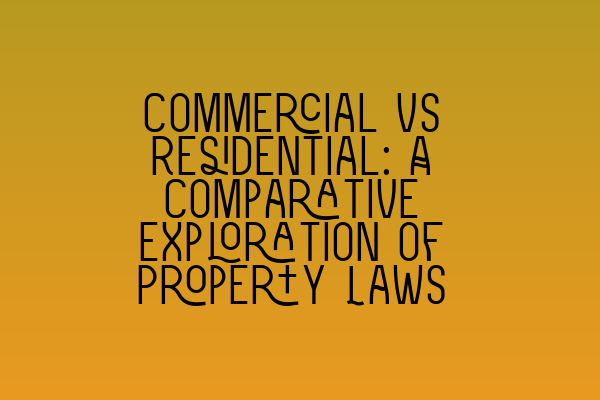**Commercial vs Residential: A Comparative Exploration of Property Laws**
Welcome to the SQE Property Law & Land Law blog! In today’s post, we delve into the fascinating world of property laws, specifically examining the differences between commercial and residential property. Understanding the nuances of these two categories is crucial for both property owners and legal professionals alike. So, let’s dive in!
**Commercial Property: Where Business Thrives**
Commercial property refers to buildings or land where businesses are conducted. This category encompasses various types of properties, including office buildings, shopping centers, warehouses, and industrial facilities. The key distinction of commercial property is its purpose for generating income or profit.
**Understanding Commercial Property Leases**
One essential aspect of commercial property is leasing. Commercial leases tend to be more complex than residential leases. They cover a wide range of elements, such as rent, lease duration, maintenance responsibilities, and permitted use of the property.
Commercial leases often involve negotiations between the landlord and the tenant to establish favorable terms for both parties. For example, the length of the lease, rental increases, and tenant improvements can be subject to negotiation.
**Legal Protection for Commercial Tenants**
Commercial tenants have different legal protections compared to residential tenants. In general, commercial leases allow for greater freedom of contract. Parties are free to negotiate terms that suit their specific business needs. This flexibility is balanced by the principle of caveat emptor, “buyer beware,” which places the onus on the tenant to conduct due diligence before entering into a lease agreement.
**Residential Property: Where Homes are Made**
Residential property, on the other hand, is primarily meant for dwelling purposes. It includes houses, apartments, condominiums, and any other property used as a private residence. Unlike commercial property, residential property is not intended for business purposes.
**The Importance of Residential Tenancy Laws**
Residential tenancy laws play a vital role in protecting the rights of tenants in residential property. These laws vary from jurisdiction to jurisdiction, but they generally cover essential aspects such as rental payments, lease duration, eviction procedures, and habitability standards.
Residential tenancy laws aim to provide a balance between the rights of tenants and the responsibilities of landlords. They often provide provisions for security deposits, rent control, and fair housing practices to ensure that tenants are treated fairly.
**Property Development: Commercial vs Residential**
Another significant difference between commercial and residential property lies in the development process. Commercial property development often involves more complex legal and regulatory requirements. Developers may need to acquire permits, undergo environmental assessments, and comply with zoning regulations.
Residential property development, while also subject to regulations, is usually more streamlined. Housing projects may require approvals and permits from local authorities, but the process is generally more straightforward. This is primarily due to the urgent need for affordable housing and the desire to encourage residential development.
**Investing in Commercial vs Residential Property**
Investing in property can be an attractive venture for those looking to grow their wealth. Both commercial and residential property offer unique opportunities and potential returns.
Commercial property investment tends to be more complicated and requires a deeper understanding of market dynamics and economic factors. Investors may seek out stable, long-term commercial tenants to ensure a steady income stream. However, commercial property can also be susceptible to economic downturns, making market research and due diligence vital.
Residential property investment, on the other hand, has the advantage of a more stable demand. The need for housing is a fundamental human requirement, which makes residential property a reliable investment option. Rental income from residential properties can provide a consistent cash flow, while the potential for capital appreciation over time adds to the long-term value.
**Conclusion**
Understanding the differences between commercial and residential property laws is crucial for both property owners and legal professionals. From the complexities of commercial leases to the legal protections for residential tenants, each category presents unique considerations.
Whether you’re looking to invest in commercial property or navigate the intricacies of residential tenancy laws, SQE Property Law & Land Law is here to assist you. Our team of experienced solicitors will provide expert guidance and representation in all matters related to property law.
**Related Articles:**
– [Understanding Contractual Capacity: Rights and Limitations](https://contract-law-sqe.co.uk/understanding-contractual-capacity-rights-and-limitations/)
– [Interactive SQE Mock Tests for Contract Law: Test Your Knowledge](https://contract-law-sqe.co.uk/interactive-sqe-mock-tests-for-contract-law-test-your-knowledge/)
– [Join Our SQE Contract Law Webinars: Expert Insights and Guidance](https://contract-law-sqe.co.uk/join-our-sqe-contract-law-webinars-expert-insights-and-guidance/)
– [Contractual Capacity: Understanding Legal Competence in Contracting Parties](https://contract-law-sqe.co.uk/contractual-capacity-understanding-legal-competence-in-contracting-parties-2/)
– [Contract Law Reforms: An Analysis of Recent Changes](https://contract-law-sqe.co.uk/contract-law-reforms-an-analysis-of-recent-changes/)
**Contact SQE Property Law & Land Law for all your property law needs. We are here to assist you every step of the way!
